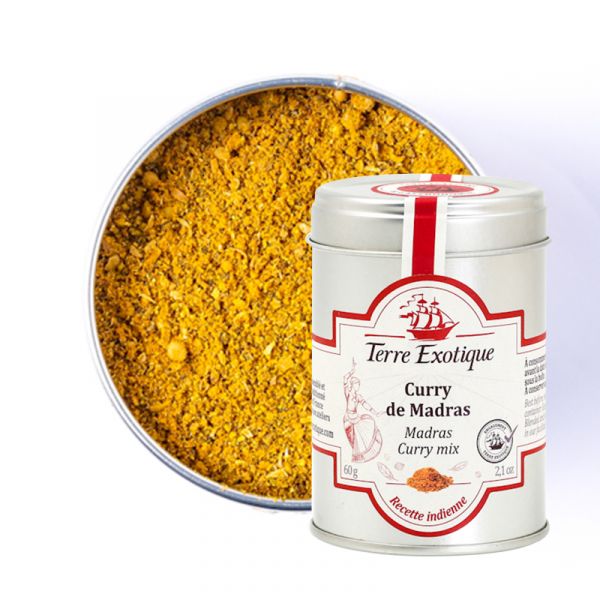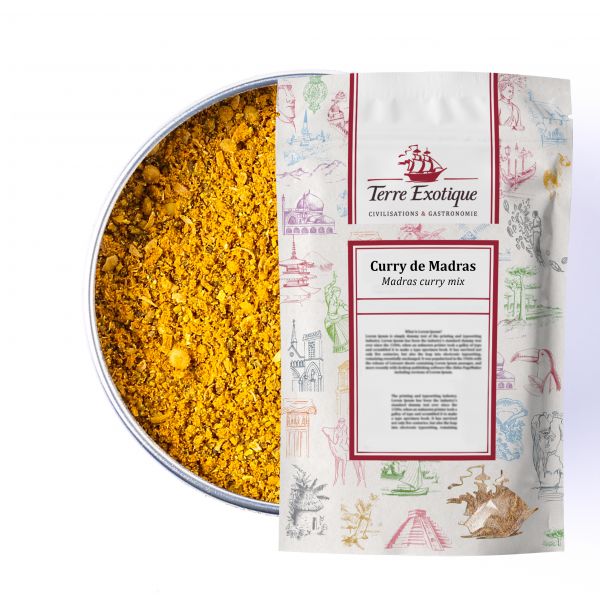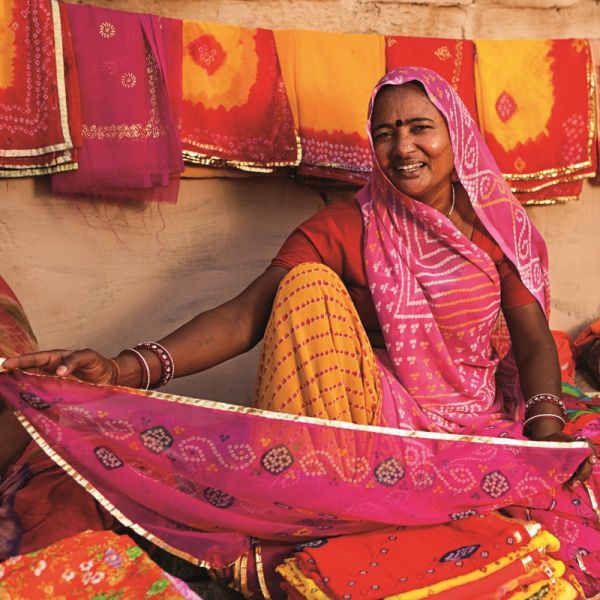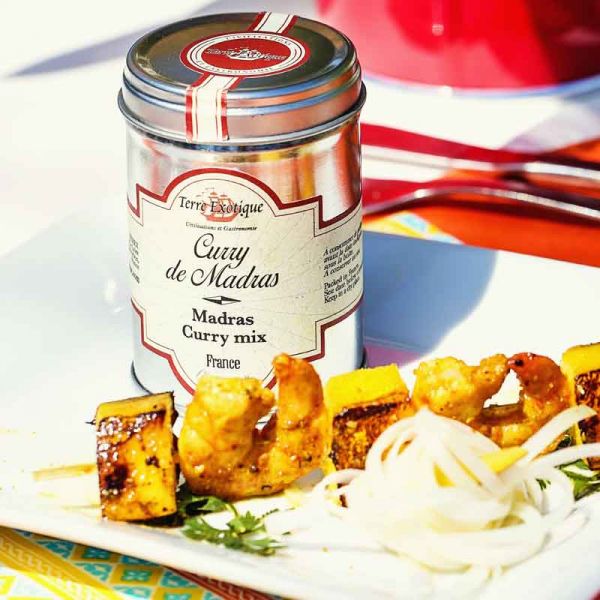







Where to use Madras curry?
Explore the delicate flavours of this Madras curry
There are plenty of ways to use Madras curry, in slow-cooked Indian dishes, or added to a pan of hot oil when frying onions, or sprinkled over chicken, fish or vegetables before roasting. Or sprinkle it directly into your lemon vinaigrette, mayonnaise, or a yoghurt and shallot sauce.How to get the best from this Madras curry?
Our recipe ideas for this Madras curry:
· Chicken Tikka Masala : add 1 teaspoon in your marinade with Greek yoghurt;· Panna cotta with mango and curry coulis : add a pinch of Madras curry to your mango before liquidizing;
· Chicken dips with Madras curry sauce : add 1 tablespoon to your mayonnaise ;
· Indian-style pan-fried vegetables : sprinkle 1 teaspoon over your vegetables before frying;
· Madras curry brioche canapés : add 2 teaspoons of Madras curry to your brioche dough;
· Lobster tail curry : sprinkle 1 teaspoon of Madras curry into the cream before adding to the lobster tails and leave to cook.
King prawn Madras curry
Ingredients15 shelled king prawns;
10cl coconut cream;
1 teaspoon Madras curry;
1 lime;
2 tomatoes;
A drizzle of olive oil.
Method
Cut the tomatoes into cubes and heat the olive oil in a frying pan. Add the king prawns to the pan and fry for 1 minute on each side. Add the lime juice and the tomatoes, Madras curry and coconut cream. Leave to simmer for 10 minutes. Serve with basmati rice or fresh tagliatelle.
The perfect spicy yet delicate spice mix
The smooth touch of turmeric
Madras curry has a distinctive yellow colour, due to the turmeric used in this blend of spices. It releases lemony and herby notes and a delicate woody hint. It will surprise your palate with its gentle warm harmonious flavours.Like a pepper with notes of ginger, Madras yellow curry is very slightly hot and spicy, and is not like red curry which is much hotter. You can even add Madras curry to children’s dishes as long as you’re not too heavy handed!
Use Madras yellow curry to enhance both your sweet and savoury dishes
This famous Indian spice mix can be used in all sorts of recipes, even desserts! Its mild and well-balanced flavours will enchant your dishes without scorching your tongue.Madras curry, tell me your secrets!
Curry, curry powder and curry leaf are all very different
The word “curry” has lots of different meanings. Curry is a stew-type dish made with sauce and spices.Curry powder, like Terre Exotique’s Madras curry, is a blend of spices used in cooking to season dishes.
Rather than the term curry, Indians are more likely to use the word “masala” which means “mix” in Hindi.
Curry paste is a blend of spices mixed with a fat-based product (sesame or peanut oil) and fresh herbs.
Curry leaf comes from the curry tree (Murraya koenigii) and is also used in cooking, like bay leaves in Western cuisine.
What’s in this Madras yellow curry?
Well-rounded and slightly spicy, Madras yellow curry is widely used in Indian cuisine and is made from lots of spices.Our Madras curry contains turmeric, coriander, cumin, fenugreek but also ginger and cardamom, all carefully selected by Terre Exotique to spice up your dishes in style!
The history behind Madras curry
Spice blends are the foundations of Indian cuisine
In India, spice mixes vary depending on the region or the cast and even each family has its very own secret recipe. There are three main types of curry: yellow, Thai and red.You know all about yellow curry now! Thai curry is renowned for its fresh flavours due to fresh coriander, parsley and lemon grass. R
ed curry is by far the strongest due to the content of chilli pepper and paprika.
There are dozens of curry recipes which each use their local spices. However virtually all spice mixes include ginger, turmeric, fenugreek, cumin and coriander.
Curry, transformed by the West from “kari”
This spice mix comes from Madras, a port on the coast of Coromandel, in Tamil nadu, South-East India, which was one of the first English trading posts.The word "curry" is probably an English transformation of the Tamil word "kari", which means the spices used for seasoning that the British sailors brought back from India. This term gradually made its way into Western vocabulary. In India, it is called "masala".
Its composition varies depending on the region, the family wealth and the cast. Indian masalas are as varied as the Sub-continent itself.
Curry is a subtle and balanced mix of several ingredients and exists since time immemorial.
Maharajas never left home without their very own curry specialist, the "masalchis".
Click here to read the article: Cooking with curry
| Allergen | Moutarde / Mustard |
|---|---|
| Native country | FRANCE |
| Ingredients | turmeric, coriander, cumin, black pepper, fennel, MUSTARD, fenugreek, |
| ginger, cinnamon, clove, green cardamom. | |
| Nutritional Info | VN Energie pour 100 g (energy for 100g) : 1276 kJ / 305.5 kcal VN Matière grasse (fat) : 12.1 g Dont acide gras saturés (of which saturated fat) : 1.6 g VN Glucides (carbohydrate) : 34.5 g Dont sucres (of which sugars) : 7.1 g VN Protéines (protein) : 12.4 g Vn Sel (salt) : 0.9 g |
| TRACES EVENTUELLES D'ALLERGÈNES | céleri, sésame, moutarde, fruits à coques. |
 Français
Français 





